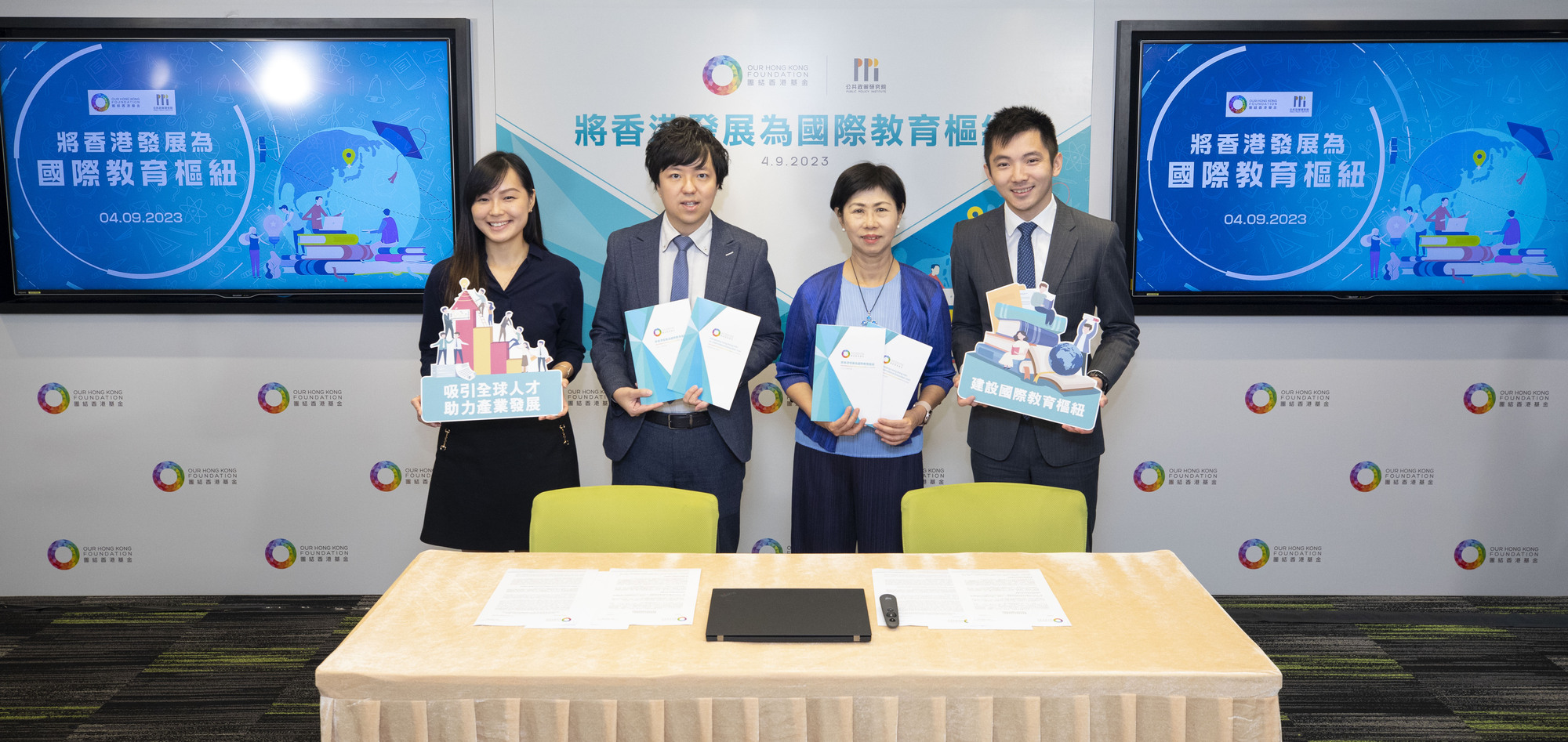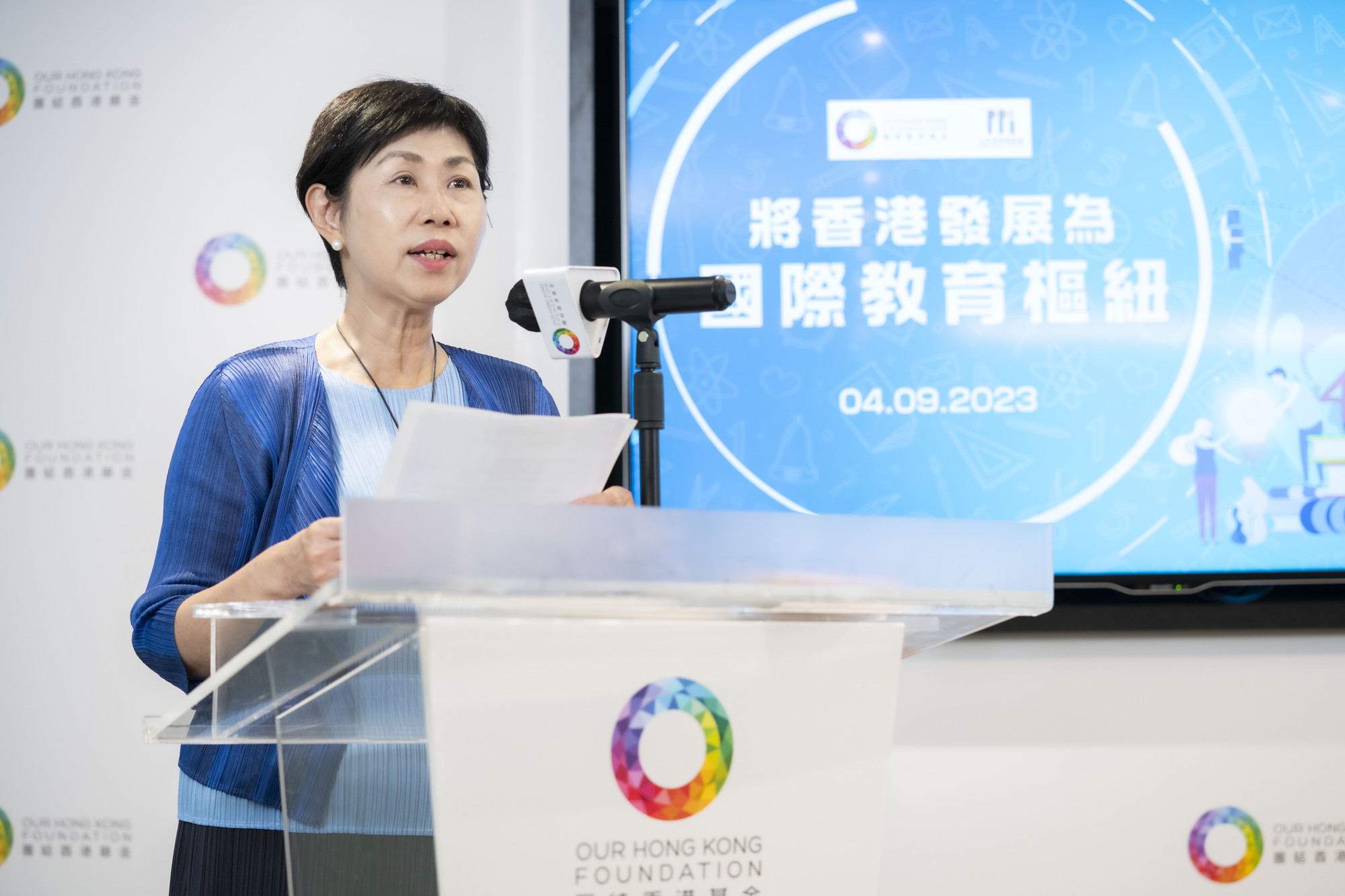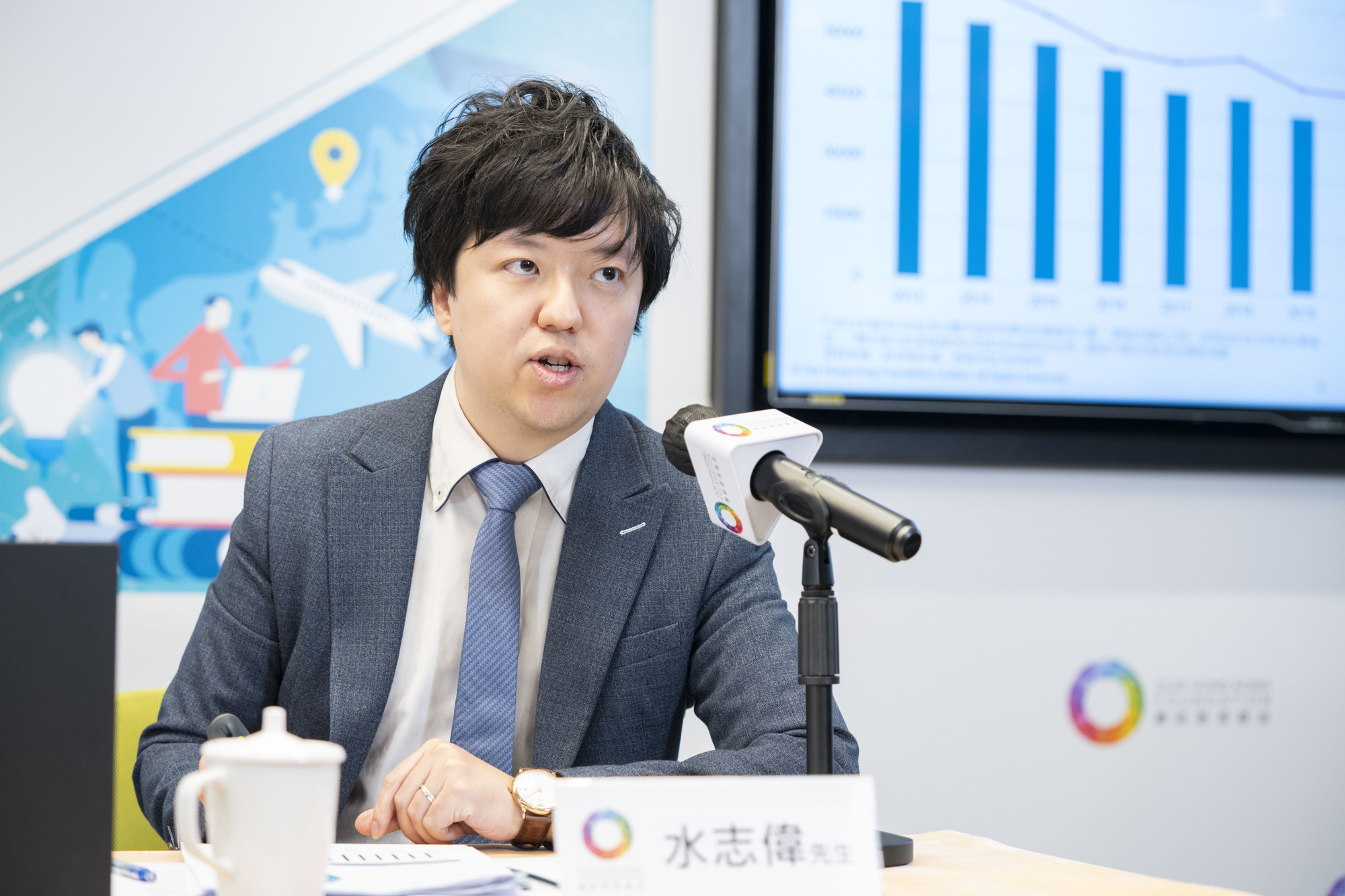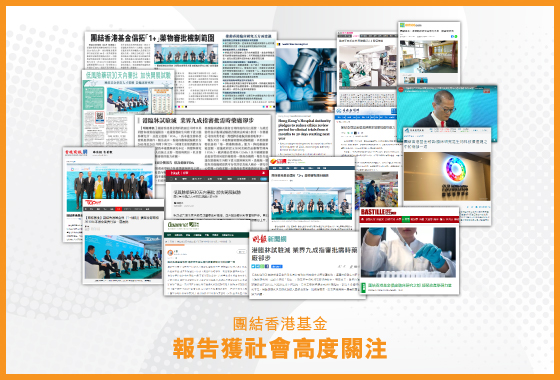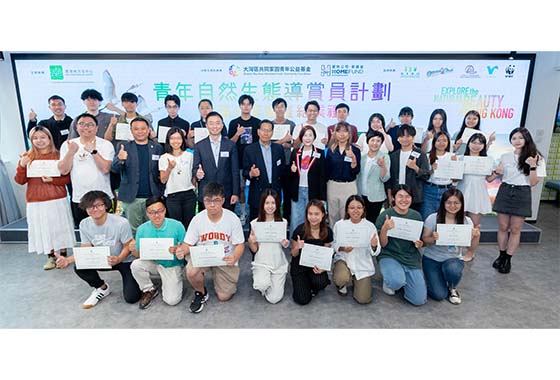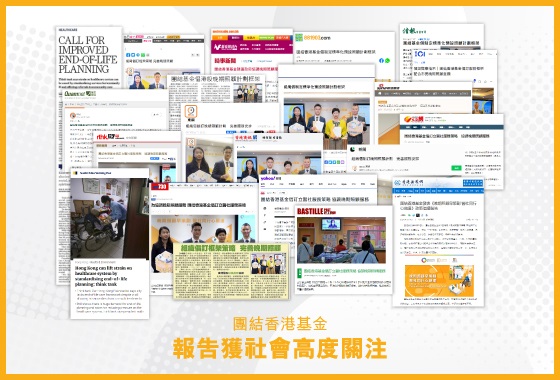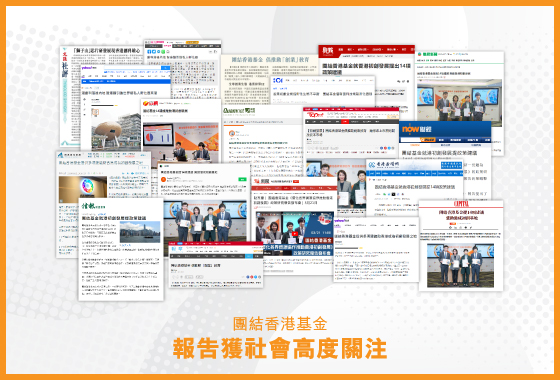Developing Hong Kong into an International Education Hub
Our Hong Kong Foundation policy advocacy report
Developing Hong Kong into an International Education Hub
(4 September 2023, Hong Kong) Our Hong Kong Foundation (OHKF) released its latest policy advocacy report entitled Developing Hong Kong into an International Education Hub today. The report emphasises that building an education hub is a key step to groom future talents for new industry planning in Hong Kong and the Greater Bay Area, especially in the midst of a global talent war. In addition, the expansion of education and training provide needed resources for talent development, and enhances Hong Kong’s exposure and attraction to the international community. That said, currently education services only account for 1.4% of Hong Kong’s GDP, far lower than major education services exporting countries such as the United Kingdom (6.3%), the United States (5.6%), and Australia (5.2%).
Furthermore, Hong Kong faces a shortage of skilled labour, with a talent outflow of 140,000 in 2020-22 and a projected shortage of 241,000 paraprofessional workers by 2027. The attraction and diversification of non-local students is therefore a strategic move to respond to the global competition for talent and to propel socio-economic growth.
Upon the conclusion of over 40 stakeholder interviews, OHKF puts forward 9 policy recommendations that cover initiatives to amplify non-local students’ motivation to study in Hong Kong, as well as measures to support life in Hong Kong and contribute to talent attraction and retention.
A Golden Opportunity not to be missed, but more efforts required
Having five top-100 universities globally, Hong Kong has been an attractive place for students from mainland China and overseas. Even so, admission rates for students from mainland China are only around 5-10% across tertiary programmes offered by University Grants Committee (UGC)-funded universities and self-financing institutions (SFIs), in some cases even lower. The current geopolitical climate also presents an opportunity to diversify the student sources by targeting top talents from ASEAN and Belt & Road countries.
Hong Kong provides the opportunity for non-local students not only to advance their studies but also to get prepared for work and gain international exposure in this region. That said, various forms of regulatory caps exist for non-local student intake, restricting the ability of certain programmes to expand. In addition, the 2004 “Memorandum of Understanding on Mutual Recognition of Higher Education Degree Certificates between the Mainland and Hong Kong” only covers degree programmes or above, making cross-region articulation difficult for sub-degree programmes. Furthermore, targeted policy initiatives are needed to leverage upcoming industrial and technological developments in the Northern Metropolis and partnerships in the Greater Bay Area (GBA) to further strengthen Hong Kong’s appeal in terms of industry-school partnerships and international connectivity.
Policy Framework to build an International Education Hub
The report proposes the below policy framework to promote Hong Kong as the study destination of choice for students from all over the world. Students come to Hong Kong primarily to progress their studies, prepare themselves for future work, and gain international exposure. As such, promoting mutual recognition between mainland and Hong Kong qualifications and raising the regulatory cap for non-local students would remove hurdles for articulation, while fostering school-industry partnership with emerging industries and deepening synergies with the GBA would offer students with augmented work readiness and international exposure.
Initiatives to bolster Hong Kong’s attractiveness must be supported by measures to enhance the study experience in Hong Kong. Living conditions, financial hurdles, and job opportunities upon graduation are all critical for talent attraction and retention.

Targeted Initiatives to amplify the motivation to study in Hong Kong
Recommendation 1: Seek mutual recognition of Higher Diploma qualification between Hong Kong and the Mainland in close collaboration with the Ministry of Education (MOE) of the People’s Republic of China. Experts in Higher Education providers have identified the lack of mutual recognition as a major hurdle in student attraction and admission. This mutual recognition arrangement would enable sub-degree graduates from the Mainland to pursue further studies in Hong Kong and vice versa, including students from vocational and professional streams. Recognising the operational hurdles due to differences in sub-degree study duration in Mainland and in Hong Kong, the Government can construct a recognised programme list starting with Higher Diploma programmes with urgent manpower needs.
Recommendation 2: Raise the cap for non-local students across University Grants Committee (UGC)-funded universities and self-financing institutions (SFIs). Interviews respondents considered UGC-funded universities’ programme expansion to be limited by the 20% cap on non-local students. The report therefore advocates for the cap to be raised to 50% for degree and sub-degree programmes; meanwhile, self-financing institutions’ cap on Mainland, Macao, Taiwan (MMT) students can be raised from the current 10-20% to 30%. The above assumes unchanged school places supply for local students. Policy implementation requires close collaboration with the Ministry of Education, as the latter cap stems from an agreement between the Mainland and Hong Kong authorities. Based on the above suggestions, the report projects that the number of non-local students across sub-degree and degree levels will increase from 10% to 23% of the total student cohort.
Currently, other levels of study such as secondary schools and the Diploma of Applied Education have no mechanism for admitting overseas students and are not well-publicised. To systematically attract and retain non-local talents at all levels of study, the Government can establish a mechanism to encourage the expansion of intake, including a quota and tuition level that ensures financial sustainability.
Recommendation 3: Leverage the Northern Metropolis to boost school-industry partnership. Specific measures include setting up an integrated university complex to group Higher Education institutions and industry organisations, targeted to provide paraprofessional training opportunities. Such measure will significantly bridge the gap between manpower demands for skilled labour and the current supply.
Recommendation 4: Enhance the synergy between Hong Kong and GBA branch campuses. GBA branch campuses, when fully utilised, offer the dual-benefit of providing students of both regions with increased industry and cultural exposure, as well as doubling the capacity to take in students who can potentially stay in Hong Kong upon graduation. More dual-degree programmes should be established where students split their duration of study between campuses and obtain both certificates upon graduation; the Government can also develop a mechanism (including tax arrangements) for faculty joint appointments, referencing the arrangements between the University of Hong Kong (HKU) and the HKU-Shenzhen Hospital.
Measures to support life of non-local students staying in Hong Kong
Non-local students face many challenges in Hong Kong including the limited availability of student hostels (and the high living cost out of campus), as well as difficulties associated with tuition and post-graduation career development. This report proposes targeted measures to strengthen Hong Kong’s appeal.
Recommendation 5: Increase the supply of commercially-run student hostels. This is a more effective way compared to university-run hostels as it avoids long construction and funding cycles and is financially self-sustainable. Detailed measures include specifying the required student hostel ratios in the Conditions of Sale in Government land tender and private lease modification/land exchange, and facilitating the conversion of hotels, apartments, and unused schools into hostels.
Recommendation 6: Extend visa schemes for non-local graduates and trainees. The Government can enhance Hong Kong’s ability to retain talents, especially for paraprofessionals, by expanding the Immigration Arrangements for Non-local Graduates (IANG) to Higher Diploma graduates. Instead of only including undergraduate or higher qualifications, this arrangement allows more graduates with paraprofessional training to stay in Hong Kong for 2 years upon graduation, thus facilitates talent retention.
Recommendation 7: Expand scholarships for ASEAN and Belt & Road students. For example, the Belt and Road Scholarship can be increased from 100 to 300 places for first-year full-time publicly-funded universities. Students from these regions require relatively more financial assistance compared to mainland China and elsewhere, and these are important considerations when seeking to diversify the sources of non-local students.
Recommendation 8: Facilitate macro-level promotion and planning to raise the attractiveness of Hong Kong’s Higher Education institutions. Promotion efforts include education fairs, forums, conferences, and other forms of on-campus activities amongst targeted regions in ASEAN and Belt & Road. Government support through the Trade Development Council in collaboration with education providers is crucial because individual institutions, especially in the self-financing sector, are generally less well-resourced. While doing so, it is also important to identify and develop specific programmes that could attract non-local students effectively.
Recommendation 9: Enhance talent retention by coordinating job opportunities. The report reveals that many of the challenges in talent retention, especially for STEM-related disciplines, are caused by the lack of employment opportunities locally. It is of paramount importance that the Government leverages our emerging “Eight Centres”, Greater Bay Area, and the Northern Metropolis developments to facilitate the virtuous cycle between talent, companies, and job opportunities.
Growing the non-local student body to achieve the vision of an education hub
With the 9 policy recommendations, OHKF envisions the percentage of non-local students for sub-degree and degree level to grow from 10% to 23% of the total student cohort, and the number for taught postgraduate to grow from 54% to 70%; while keeping the number of school places for local students at the same level. Collectively, these measures will boost Hong Kong as a preferred location for non-local students, establish our status as an international education hub, and contribute to sustainable societal development.
OHKF President Dr Jane Lee said: “As Hong Kong embarks on an era of new technological and industrial developments, attracting and grooming future-ready talents is important. Hong Kong should therefore become an international education hub to respond to the shortage of talents and manpower development needs.”
OHKF Vice President & Co-Head of Research Mr Kenny Shui remarked: “Education services accounts for a significant percentage of GDP in developed economies. With its five top-100 universities, Hong Kong’s education sector has the potential to reach new heights and become a powerhouse of economic growth.”
OHKF Assistant Research Director & Head of Education and Youth Mr Victor Kwok commented: “Attracting and retaining non-local students is a strategic move to respond to the global talent war. Other than raising quotas, the Government also needs to enhance the study experience in Hong Kong to boost our appeal to the international community.”
Full Contents of Developing Hong Kong into an International Education Hub:
https://bit.ly/3Z4tgJe
